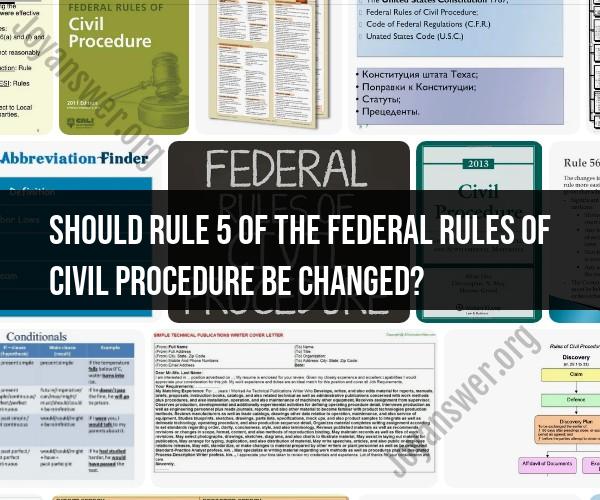Should rule 5 of the Federal Rules of civil procedure be changed?
The debate over whether Rule 5 of the Federal Rules of Civil Procedure (FRCP) should be changed is a matter of ongoing discussion among legal professionals, scholars, and policymakers. Rule 5 governs the service and filing of pleadings and other papers in federal civil litigation. Whether or not it should be changed depends on various factors, including evolving legal practice, technological advancements, and the need to balance transparency and efficiency in the legal system.
Potential arguments for changing Rule 5 may include:
Digital Technology: As technology has advanced, there is an argument for adapting Rule 5 to accommodate electronic filing and service of documents. Many federal courts have already implemented electronic filing systems (known as CM/ECF), which have significantly improved efficiency and accessibility. Modernizing the rule to reflect these changes could enhance the overall litigation process.
Environmental Impact: Reducing the amount of paper used in legal filings by encouraging electronic filing can have a positive environmental impact. This change aligns with broader sustainability goals.
Access to Justice: Electronic filing can improve access to the legal system, making it easier for individuals and organizations, especially those in remote or underserved areas, to file documents and participate in federal litigation.
Efficiency: Electronic filing and service can streamline the litigation process, reducing costs, delays, and errors associated with physical paper documents.
Consistency and Uniformity: Changes to Rule 5 could enhance uniformity across federal courts, promoting consistent practices and reducing confusion among legal professionals.
On the other hand, there may be arguments against changing Rule 5:
Digital Divide: Some may argue that mandating electronic filing could disadvantage those who lack access to technology or digital literacy skills. Changes should consider addressing the digital divide.
Privacy and Security Concerns: Electronic filing and service require secure systems to protect sensitive legal documents and personal information. Any changes should address these concerns comprehensively.
Transition Costs: Implementing electronic filing systems can be costly for courts and parties. Funding and resources are necessary to ensure a smooth transition.
Preservation of Paper Records: Some stakeholders may emphasize the importance of retaining paper records for certain types of documents or in specific cases, such as matters with long-term historical significance.
Balancing Tradition and Innovation: Changes to Rule 5 should balance the need for modernization with respect for legal tradition and established practices.
Ultimately, the question of whether Rule 5 should be changed will depend on a careful consideration of the pros and cons, as well as the specific needs and concerns of the legal community, courts, and litigants. Any proposed changes would likely involve a thorough rulemaking process with input from legal experts and interested parties, including opportunities for public comment and feedback from those directly affected by the rule.
Exploring Rule 5 of the Federal Rules of Civil Procedure
Rule 5 of the Federal Rules of Civil Procedure (FRCP) governs the service of process and other papers in civil cases. The rule requires that all pleadings and other important documents be served on all parties in the case.
Rule 5 is an important part of the FRCP because it ensures that all parties have notice of the proceedings and an opportunity to respond. The rule also helps to promote fairness and efficiency by ensuring that all parties are aware of the deadlines and requirements of the case.
Arguments for Changing Rule 5
There are a number of arguments for changing Rule 5. One argument is that the rule is outdated and does not reflect the current state of technology. For example, the rule does not explicitly address how to serve process electronically.
Another argument for changing Rule 5 is that the rule is too complex and difficult to understand. The rule is full of technical language and legal jargon, which can make it difficult for non-lawyers to comply with the rule.
Finally, some people argue that Rule 5 is too burdensome and expensive. The rule requires parties to serve all pleadings and other important documents on all parties in the case, even if the documents are not relevant to all parties. This can lead to unnecessary costs and delays.
Arguments Against Changing Rule 5
There are also a number of arguments against changing Rule 5. One argument is that the rule is working well and does not need to be changed. The rule has been in place for many years and has helped to ensure fairness and efficiency in federal civil procedure.
Another argument against changing Rule 5 is that any changes could have unintended consequences. For example, if the rule is made less burdensome, it could lead to more parties defaulting on their cases.
Finally, some people argue that changing Rule 5 would be too complicated and time-consuming. The rule is a complex part of the FRCP and any changes would need to be carefully considered to avoid unintended consequences.
Proposed Revisions to Rule 5 and Their Implications
There have been a number of proposals to revise Rule 5. One proposal is to simplify the rule and make it more user-friendly. This could involve removing technical language and legal jargon, and providing more examples of how to comply with the rule.
Another proposal is to make the rule more flexible. This could involve allowing parties to serve documents electronically, or allowing parties to serve fewer documents on certain parties.
Any revisions to Rule 5 would need to be carefully considered to avoid unintended consequences. For example, simplifying the rule could make it easier for parties to comply with the rule, but it could also make it easier for parties to abuse the rule.
The Future of Rule 5 in Federal Civil Procedure
It is unclear whether Rule 5 will be changed in the near future. However, it is likely that the rule will continue to be debated and discussed. The rule is an important part of the FRCP, and it is important to ensure that the rule is fair, efficient, and easy to understand.
If you are interested in learning more about Rule 5, or if you have any thoughts on whether the rule should be changed, you should consult with an attorney.













